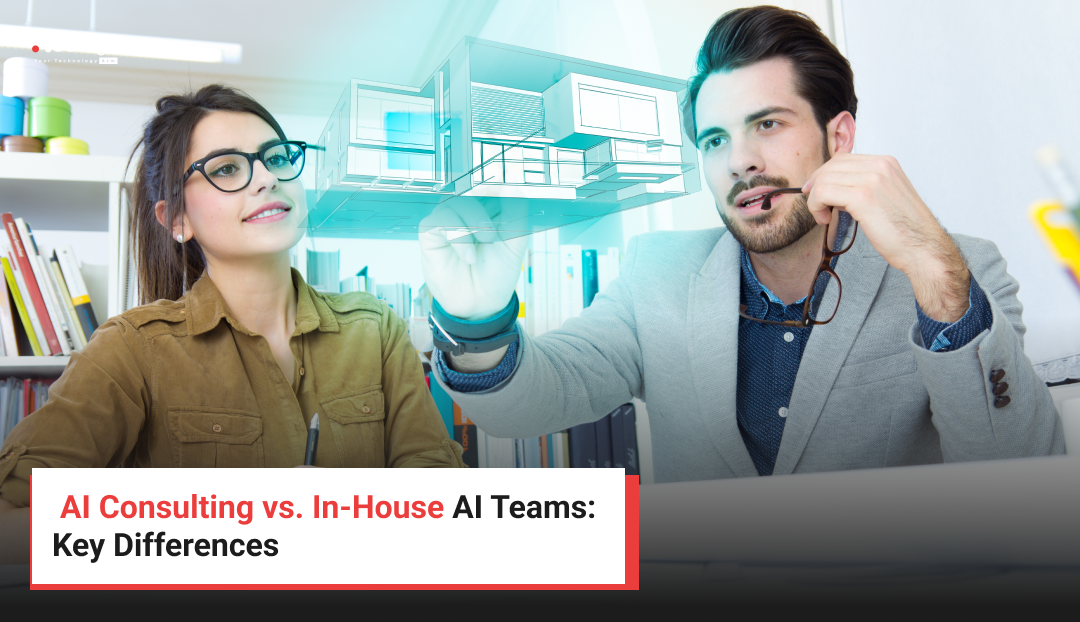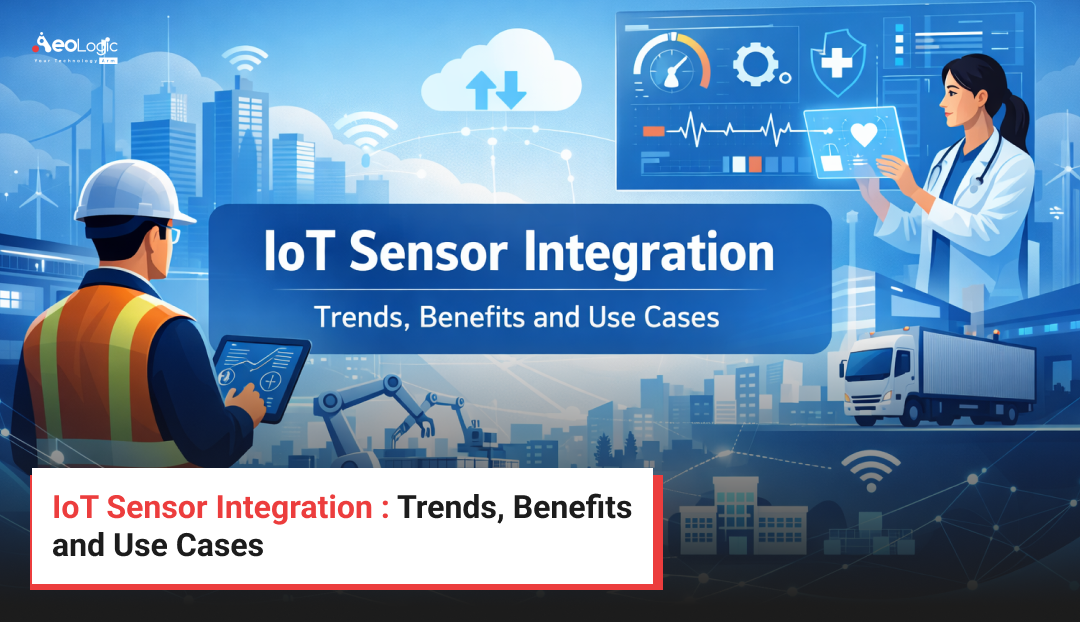Artificial Intelligence (AI) is no longer just a futuristic idea — it’s already reshaping every industry, from healthcare to logistics. But as more organizations adopt AI, one question keeps coming up:
Should we build our own AI team or hire AI consulting experts?
This is the core of the discussion around AI Consulting vs. In-House AI Teams.
Both paths can lead to success, but they differ in cost, control, scalability, and long-term value. Many companies struggle to pick the right one — and often the wrong choice leads to wasted money or delayed innovation.
This article breaks down these two approaches in detail — how each works, their benefits, challenges, and which model fits better depending on your business stage.
What Is AI Consulting?
AI consulting is when a company partners with an external agency or expert team that specializes in AI development, strategy, and deployment.
Instead of hiring new people, businesses collaborate with AI consultants who already have the experience, tools, and technical setup to execute AI projects efficiently.
Consultants typically:
-
Evaluate business problems and identify potential AI solutions.
-
Design the roadmap, model architecture, and technology stack.
-
Build prototypes or proof of concepts (POCs).
-
Train, test, and deploy AI models into production.
-
Provide ongoing monitoring and optimization.
In short, AI consulting brings ready-made expertise and industry experience — ideal for businesses that want quick, high-quality AI results without building internal infrastructure from scratch.
What Are In-House AI Teams?
An in-house AI team means developing internal capability by hiring full-time data scientists, ML engineers, AI developers, and product managers. These professionals are part of the organization and work exclusively on internal projects.
They handle everything — from collecting data and cleaning it, to building, training, and maintaining AI models.
In-house teams:
-
Have deep understanding of company data and operations.
-
Build custom AI models tailored to the organization.
-
Manage long-term innovation and AI roadmaps.
While building such a team requires heavy investment in time, tools, and training, it offers complete control and ensures that intellectual property (IP) stays within the company.
Why Companies Compare AI Consulting vs. In-House AI Teams
The AI market is growing rapidly, but resources are limited. Skilled AI engineers are expensive, and hiring them takes months. At the same time, technology evolves so fast that by the time your in-house team is ready, tools might already have changed.
That’s why companies often weigh AI Consulting vs. In-House AI Teams carefully:
-
Consulting gives quick access to experts and solutions.
-
In-house teams offer control and deep business alignment.
Each path has clear strengths — but also trade-offs.
Key Differences Between AI Consulting and In-House AI Teams
Before deciding which model fits your business, it’s important to understand how they differ across several core areas.
| Factor | AI Consulting | In-House AI Teams |
|---|---|---|
| Speed | Consultants are ready to start immediately with pre-built frameworks. | Hiring, onboarding, and setting up take months. |
| Cost | Lower upfront cost, paid per project or hourly. | High fixed costs for salaries, infrastructure, and tools. |
| Flexibility | Highly flexible — scale up or pause anytime. | Limited flexibility due to contracts and HR processes. |
| Control | Consultants deliver under agreed scope; control is shared. | Full control over strategy, tasks, and priorities. |
| Knowledge Retention | Knowledge transfer needed after project ends. | Knowledge stays within the organization permanently. |
| Risk | Vendor assumes delivery risk. | Company holds all project risks. |
| Best For | Fast results, short-term or pilot AI initiatives. | Long-term strategy, continuous AI innovation. |
In simple terms:
-
AI consulting = agility and expertise.
-
In-house AI = control and continuity.
Benefits of AI Consulting
Many growing businesses prefer AI consulting to start their AI journey because it allows them to experiment, validate, and scale faster without high investment.
Here are the key advantages explained in plain terms:
Quick Project Kickoff
AI consulting firms already have trained data scientists, ML engineers, and infrastructure. They can begin your project within days — a huge advantage for businesses that want results fast.
For instance, a retail company can hire an AI consulting partner to build a recommendation engine and deploy it within weeks, instead of waiting months to hire an internal team.
Cost-Effective Start
Building an AI team from scratch can be expensive. Between salaries, hardware, and training, the cost quickly adds up.
AI consulting offers a lower-risk entry point. You can start with a defined budget, get measurable results, and decide later if expanding internally makes sense.
Access to Diverse Expertise
Consulting firms work across industries — healthcare, logistics, finance, manufacturing, and more. This exposure gives them a wider understanding of AI use cases and problem-solving strategies.
When you hire them, you don’t just get coders — you get a full team with strategists, data scientists, and domain experts who know what works and what doesn’t.
Proven Tools and Frameworks
AI consultants often bring pre-built solutions, tested libraries, and automation tools that speed up project delivery.
Instead of experimenting from scratch, your business can use already-optimized methods, saving both time and cost.
Focus on Core Business
By outsourcing the AI development part, your internal teams can stay focused on business growth, sales, or product design.
You don’t have to split attention between managing people and learning new technologies — the consultant handles it for you.
Lower Risk of Failure
AI consultants have worked on multiple implementations. They’ve seen what causes projects to fail and know how to avoid those pitfalls.
For example, they can help ensure your project has the right data pipeline, model validation, and deployment strategy — reducing the chances of costly mistakes.
Flexibility in Engagement
You can hire AI consultants for a single use case — like image recognition, customer behavior prediction, or process automation — and then disengage after delivery.
This “on-demand model” lets you keep costs variable, not fixed.
Real-World Example: A Manufacturing Use Case
A mid-sized manufacturing company wanted to use AI to predict equipment failures. Instead of hiring a team, they partnered with an AI consulting firm.
The consultants built a predictive maintenance model in two months using the company’s existing machine data. The result — reduced downtime by 20% and savings of nearly $150,000 in one year.
Later, when the company was ready to make AI part of its operations, they hired two data engineers internally and built on top of what the consultants had created.
That’s how consulting can act as a bridge to long-term AI success.
Benefits of Building In-House AI Teams
While AI consulting offers speed and flexibility, many organizations prefer to invest in building their own AI teams. An in-house setup creates long-term value and a deeper integration of AI into everyday business operations.
Let’s break down why companies choose this route.
Deep Business Understanding
In-house teams live and breathe the company’s processes, challenges, and culture. They know the data inside out — how it’s collected, stored, and used. This deep understanding helps them build AI models that fit the organization’s unique needs rather than generic solutions.
For example, an e-commerce firm with its own AI team can continuously fine-tune product recommendations based on subtle changes in customer behavior, something external consultants might miss.
Full Ownership of Intellectual Property (IP)
When you develop AI models internally, all algorithms, datasets, and source codes belong entirely to your company. This is especially important for industries handling sensitive or proprietary data, like banking, defense, or healthcare.
It eliminates dependency on third parties and ensures that no critical technology leaves your organization.
Long-Term Cost Efficiency
Yes, building an internal AI team requires upfront investment, but over time it can become more economical. Once the infrastructure is in place, you save money by avoiding repeated consulting costs for every new project.
Companies with continuous AI projects — such as analytics platforms, automation tools, or AI-powered customer service — often find this model more sustainable.
Faster Iterations and Continuous Improvement
In-house teams can continuously refine AI models, experiment with new datasets, and integrate improvements without needing external approvals. This results in faster innovation cycles.
When the AI capability is internal, it’s easier to test small improvements, track performance, and deploy updates quickly — essential for competitive industries like retail or fintech.
Integration Across the Organization
Unlike consulting engagements that may be limited to one department, in-house AI teams can collaborate with multiple departments — marketing, logistics, operations, customer support — creating a more unified AI strategy.
They help the company evolve into a data-driven organization instead of treating AI as an isolated project.
Better Communication and Collaboration
An internal team works in the same time zone, shares the same communication tools, and understands the company’s workflows. This makes coordination smoother, avoids misunderstandings, and keeps everyone aligned on goals.
Building Organizational Knowledge
When your team develops AI solutions, they learn valuable lessons and gain expertise over time. This knowledge becomes part of your company’s intellectual capital — something no consultant can fully replicate.
It’s a long-term investment in your people and your culture of innovation.
Challenges in Both Models
Neither AI consulting nor in-house AI teams are perfect. Each approach comes with its own difficulties that businesses must anticipate.
Challenges of AI Consulting
-
Limited Control:
Consultants manage most technical work. While you can set objectives, you don’t always control daily progress or methodology. -
Knowledge Transfer Issues:
Once the consulting contract ends, internal teams may struggle to maintain or improve the models unless proper documentation and training are done. -
Data Security Concerns:
Giving external vendors access to sensitive data can create compliance and privacy challenges. -
Hidden Costs:
Changes in scope, extra iterations, or long-term support can increase overall costs if not clearly defined in contracts.
Challenges of In-House AI Teams
-
High Initial Investment:
Building infrastructure, hiring data scientists, and purchasing software licenses can be expensive. -
Talent Shortage:
AI engineers and data scientists are in high demand, making it tough to hire and retain them. -
Slower Start:
Building a team and setting up tools takes time, which can delay project timelines. -
Maintenance Overhead:
Internal teams require ongoing management, training, and operational support to stay up-to-date.
Choosing Between the Two Models
How do you decide between AI Consulting vs. In-House AI Teams? It comes down to your business goals, budget, and how critical AI is to your core operations.
Here’s a quick guide:
| Situation | Best Fit |
|---|---|
| You’re exploring AI for the first time. | AI Consulting |
| You need quick results or a short-term solution. | AI Consulting |
| AI is strategic and central to your business growth. | In-House AI Team |
| You need ongoing AI maintenance and improvement. | In-House AI Team |
| You want to reduce risk and cost in the beginning. | Start with Consulting, then Transition |
The Hybrid Approach – Best of Both Worlds
For many growing businesses, the perfect solution isn’t just one model — it’s a mix of both.
This is called a hybrid approach, where companies start with AI consulting partners to design and implement the first few AI projects, and then slowly build their in-house AI team to take over long-term operations.
This method gives you the speed of consulting and the control of an in-house team.
Let’s see how it works:
-
Phase 1: Strategy and Prototype
The AI consulting firm handles initial research, feasibility studies, and proof of concept (POC). -
Phase 2: Development and Deployment
Consultants work with your internal stakeholders to build and deploy the AI solution. -
Phase 3: Knowledge Transfer
Before closing the project, the consulting team trains your internal employees on how to operate and maintain the system. -
Phase 4: In-House Ownership
Once your team gains confidence, they take full charge and continue improving or scaling the solution.
This approach reduces risk, cuts costs, and helps your organization become self-sufficient in AI.
When Hybrid Makes the Most Sense
The hybrid model is ideal if your business:
-
Is new to AI and needs guidance to start.
-
Has limited internal technical resources.
-
Wants to test AI benefits before full adoption.
-
Plans to build long-term AI capability later.
Example:
A logistics company hired an AI consulting firm to create a predictive route optimization model. Once it was live and stable, they built an internal analytics team to monitor and enhance it. The transition was smooth because the consulting firm provided proper training and documentation.
This kind of cooperation lets companies grow at their own pace — without rushing into expensive permanent setups.
Final Words
Choosing between AI Consulting vs. In-House AI Teams is not about right or wrong — it’s about timing and priorities.
If your goal is fast implementation and early AI success, consulting is a great starting point.
If you’re focused on long-term innovation and data control, building your internal AI team is worth the effort.
And if you want both — start with consulting, learn from experts, and gradually grow your own team with that experience.
What matters most is that your AI strategy aligns with your business goals, resources, and future vision.
FAQs
1. What’s the main difference between AI consulting and in-house AI teams?
AI consulting involves working with external experts for specific AI projects, while an in-house team is built and managed within your company for ongoing AI initiatives.
2. Which one is better for small or growing businesses?
For startups and small businesses, AI consulting is often more practical. It gives quick access to top talent without high hiring costs.
3. Can a company switch from consulting to in-house later?
Yes. Many businesses start with consulting to gain experience and then gradually form internal teams — this is the hybrid model.
4. What about data privacy when using consultants?
Always ensure your consulting partner signs NDAs and complies with data protection regulations. Aeologic follows strict data security and confidentiality standards.
5. How does Aeologic support long-term AI growth?
Aeologic helps clients start with consulting and then assists in building internal AI teams through training, co-development, and staff augmentation.

Passionate about breaking down complex tech into simple ideas. Covers everything from AI and software development to gadgets and emerging tech trends.






